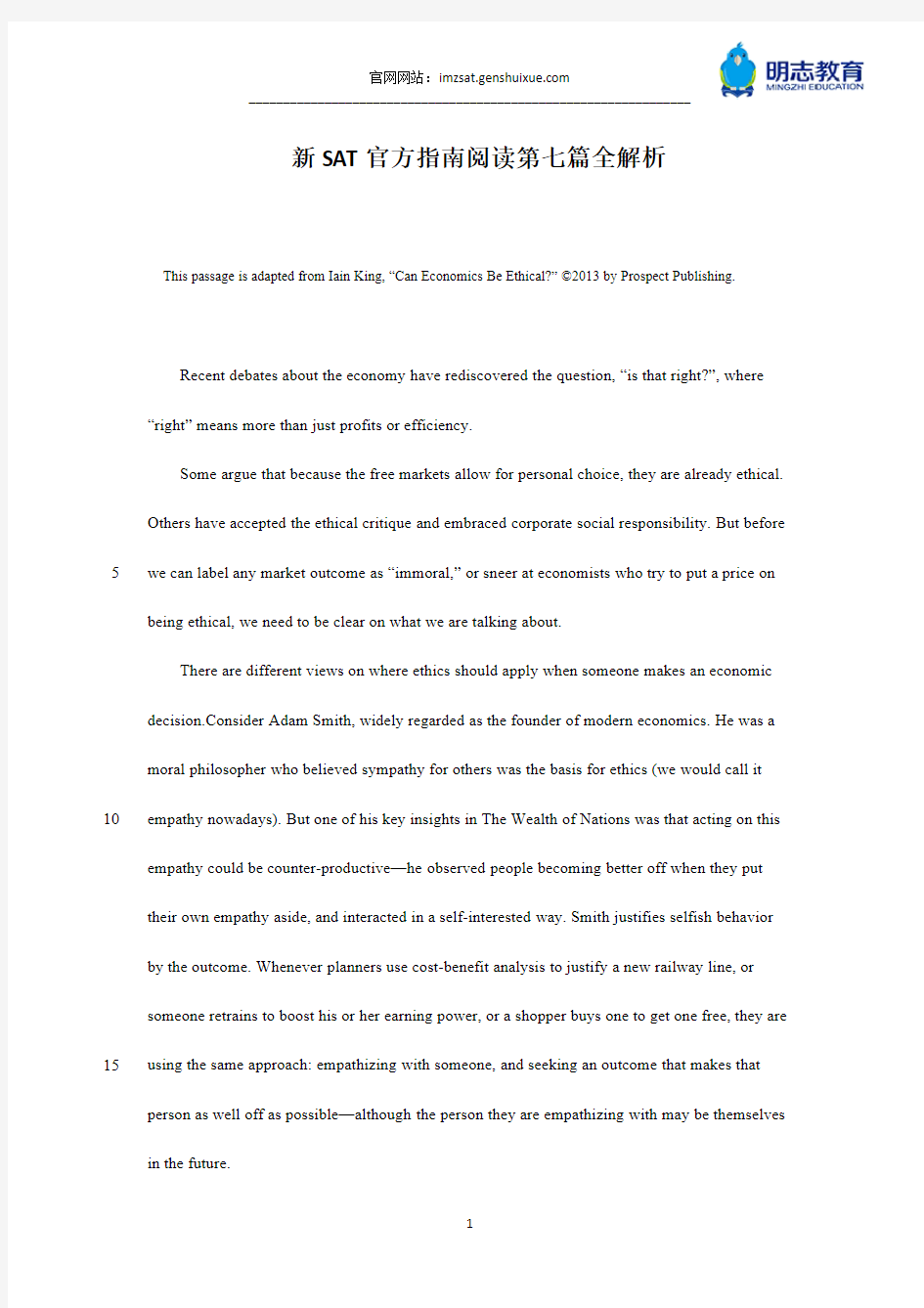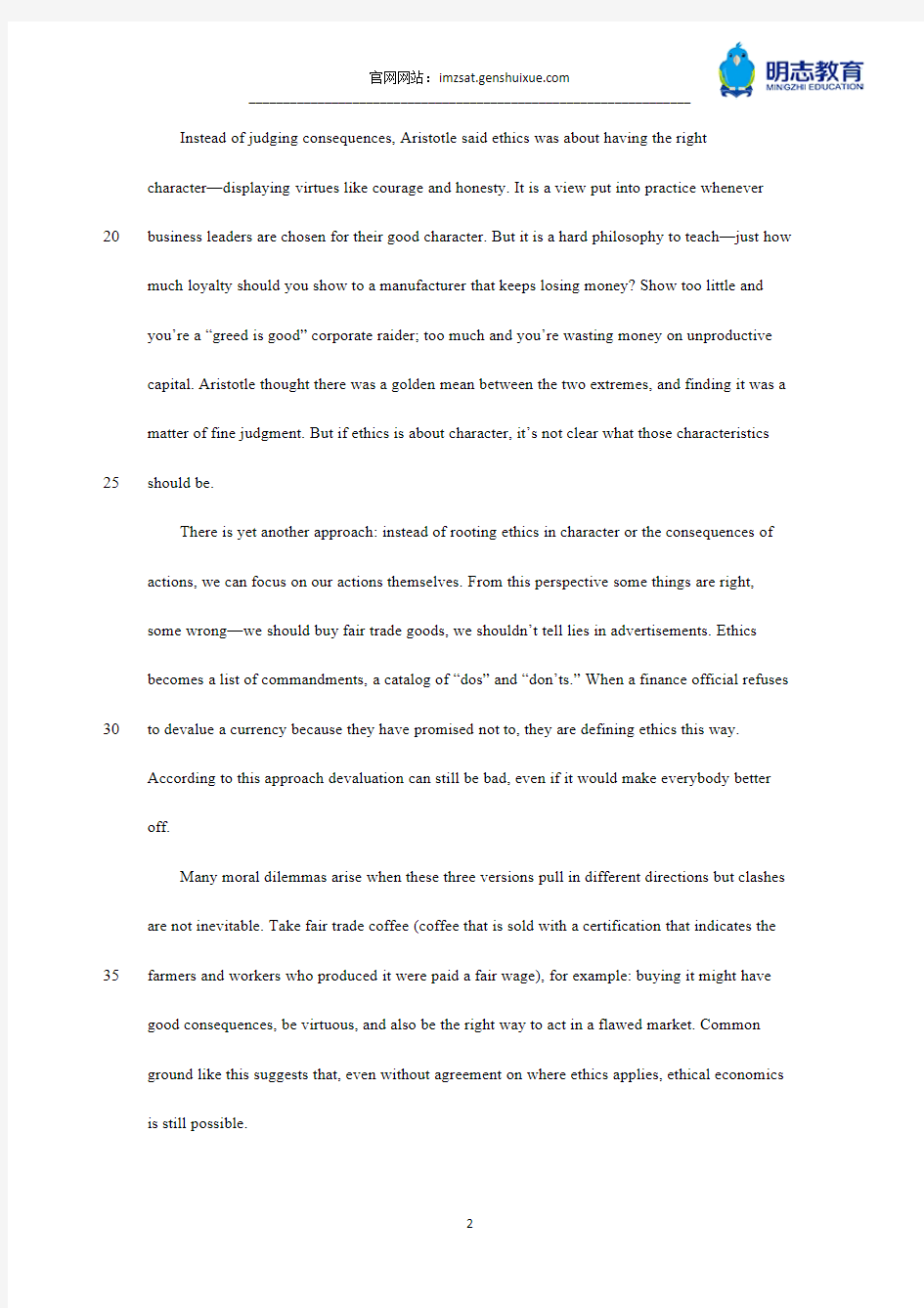新SAT官方指南阅读第七篇全解析


新SAT官方指南阅读第七篇全解析
This passage is adapted from Iain King,“Can Economics Be Ethical?”?2013by Prospect Publishing.
Recent debates about the economy have rediscovered the question,“is that right?”,where “right”means more than just profits or efficiency.
Some argue that because the free markets allow for personal choice,they are already ethical.
Others have accepted the ethical critique and embraced corporate social responsibility.But before 5
we can label any market outcome as“immoral,”or sneer at economists who try to put a price on being ethical,we need to be clear on what we are talking about.
There are different views on where ethics should apply when someone makes an economic decision.Consider Adam Smith,widely regarded as the founder of modern economics.He was a moral philosopher who believed sympathy for others was the basis for ethics(we would call it
10
empathy nowadays).But one of his key insights in The Wealth of Nations was that acting on this empathy could be counter-productive—he observed people becoming better off when they put
their own empathy aside,and interacted in a self-interested way.Smith justifies selfish behavior by the outcome.Whenever planners use cost-benefit analysis to justify a new railway line,or
someone retrains to boost his or her earning power,or a shopper buys one to get one free,they are using the same approach:empathizing with someone,and seeking an outcome that makes that
15
person as well off as possible—although the person they are empathizing with may be themselves in the future.
Instead of judging consequences,Aristotle said ethics was about having the right character—displaying virtues like courage and honesty.It is a view put into practice whenever
20
business leaders are chosen for their good character.But it is a hard philosophy to teach—just how much loyalty should you show to a manufacturer that keeps losing money?Show too little and
you’re a“greed is good”corporate raider;too much and you’re wasting money on unproductive capital.Aristotle thought there was a golden mean between the two extremes,and finding it was a matter of fine judgment.But if ethics is about character,it’s not clear what those characteristics should be.
25
There is yet another approach:instead of rooting ethics in character or the consequences of actions,we can focus on our actions themselves.From this perspective some things are right,
some wrong—we should buy fair trade goods,we shouldn’t tell lies in advertisements.Ethics
becomes a list of commandments,a catalog of“dos”and“don’ts.”When a finance official refuses to devalue a currency because they have promised not to,they are defining ethics this way.
30
According to this approach devaluation can still be bad,even if it would make everybody better off.
Many moral dilemmas arise when these three versions pull in different directions but clashes are not inevitable.Take fair trade coffee(coffee that is sold with a certification that indicates the 35
farmers and workers who produced it were paid a fair wage),for example:buying it might have good consequences,be virtuous,and also be the right way to act in a flawed https://www.360docs.net/doc/db3649977.html,mon
ground like this suggests that,even without agreement on where ethics applies,ethical economics is still possible.
Whenever we feel queasy about“perfect”competitive markets,the problem is often rooted in 40
a phony conception of people.The model of man on which classical economics is based—an
entirely rational and selfish being—is a parody,as John Stuart Mill,the philosopher who
pioneered the model,accepted.Most people—even economists—now accept that this“economic man”is a fiction.We behave like a herd;we fear losses more than we hope for gains;rarely can our brains process all the relevant facts.
These human quirks mean we can never make purely“rational”decisions.A new wave of 45
behavioral economists,aided by neuroscientists,is trying to understand our psychology,both
alone and in groups,so they can anticipate our decisions in the marketplace more accurately.But psychology can also help us understand why we react in disgust at economic injustice,or accept a moral law as universal.Which means that the relatively new science of human behavior might
50
also define ethics for us.Ethical economics would then emerge from one of the least likely places: economists themselves.
11.The main purpose of the passage is to
A)consider an ethical dilemma posed by cost-benefit analysis.
B)describe a psychology study of ethical economic behavior.
C)argue that the free market prohibits ethical economics.
D)examine ways of evaluating the ethics of economics.
正确答案:D
分析:文章第7-8行介绍了中心思想,即做经济决策时关于道德适用性的不同观点(different views on where ethics should apply when someone makes an economic decision)。文章分析了众多历史人物关于道德和经济的观点。
12.In the passage,the author anticipates which of the following objections to criticizing the ethics of free markets?
A)Smith’s association of free markets with ethical behavior still applies today.
B)Free markets are the best way to generate high profits,so ethics are a secondary consideration.
C)Free markets are ethical because they are made possible by devalued currency.
D)Free markets are ethical because they enable individuals to make choices.
正确答案:D
分析:文章第4-5行,作者提到人们反对在自由市场中批判道德是因为他们相信自由市场本身是道德的,因此,自由市场中的道德没有必要去研究。评论家认为,自由市场是道德的,因为他们允许人们做出自由选择。
13.Which choice provides the best evidence for the answer to the previous question?
A)Line3(“Some...ethical”)
B)Lines4-6(“But...about”)
C)Lines12-13(“Smith...outcome”)
D)Lines29-30(“When...way”)
正确答案:A
分析:见第12题解释。
14.As used in line4,“embraced”most nearly means
A)lovingly held.
B)readily adopted.
C)eagerly hugged.
D)reluctantly used.
正确答案:B
分析:文章第4行,作者提到人们接受道德评判,乐意接受全体社会责任(have accepted the ethical critique and embraced corporate social responsibility).
15.The main purpose of the fifth paragraph(lines26-32)is to
A)develop a counterargument to the claim that greed is good.
B)provide support for the idea that ethics is about character.
C)describe a third approach to defining ethical economics.
D)illustrate that one’s actions are a result of one’s character.
正确答案:C
分析:文章第三段和第四段分别介绍了亚当·史密斯和亚里士多德定义道德经济学的不同方法。第五个段落提供了定义道德经济学的第三种方法。
16.As used in line33,“clashes”most nearly means
A)conflicts.
B)mismatches.
C)collisions.
D)brawls.
正确答案:A
分析:文章33-34行作者提到:当三种不同观点朝向不同方向,最终冲突不可避免时,道德困境就会发生(Many moral dilemmas arise when these three versions pull in different directions but clashes are not inevitable.)
17.Which choice best supports the author’s claim that there is common ground shared by the different approaches to ethics described in the passage?
A)Lines7-8(“There...decision”)
B)Lines27-28(“From...advertisements”)
C)Lines34-36(“Take...market”)
D)Lines43-44(“We...facts”)
正确答案:C
分析:在34-36行中,作者暗示到:三种关于道德经济的观点都可以在公平贸易咖啡中应用。这三种方法拥有共同基础(common ground),而且彼此互不冲突。
18.The main idea of the final paragraph is that
A)human quirks make it difficult to predict people’s ethical decisions accurately.
B)people universally react with disgust when faced with economic injustice.
C)understanding human psychology may help to define ethics in economics.
D)economists themselves will be responsible for reforming the free market.
正确答案:C
分析:文章47-50行,作者提到心理学可以帮助我们定义道德(define ethics for us). 19.Data in the graph about per-pound coffee profits in Tanzania most strongly support which of the following statements?
A)Fair trade coffee consistently earned greater profits than regular coffee earned.
B)The profits earned from regular coffee did not fluctuate.
C)Fair trade coffee profits increased between2004and2006.
D)Fair trade and regular coffee were earning equal profits by2008.
正确答案:A
分析:图表中的数据显示:2000年-2008年期间,Tanzania生产的公平贸易咖啡利润约是每磅1.3美元,而普通咖啡利润每磅约是20到60美分。
20.Data in the graph indicate that the greatest difference between per-pound profits from fair trade coffee and those from regular coffee occurred during which period?
A)2000to2002
B)2002to2004
C)2004to2005
D)2006to2008
正确答案:B
分析:图表数据显示:2002年到2004年期间每磅公平贸易咖啡与普通咖啡的利润差为1美元。
21.Data in the graph provide most direct support for which idea in the passage?
A)Acting on empathy can be counterproductive.
B)Ethical economics is defined by character.
C)Ethical economics is still possible.
D)People fear losses more than they hope for gains.
正确答案:C
分析:文章将公平贸易咖啡定义为被贴上了认证标签的咖啡,这种认证标签可以表明生产咖啡的农民和工人都获得了公平工资。通过这种定义可以看出,购买公平贸易咖啡实际上是一种道德选择。图表中数据表明公平贸易咖啡比普通咖啡价格高,说明道德经济仍然是大家的一种选择。
